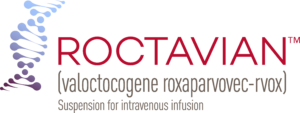
ROCTAVIAN is an adeno-associated virus vector-based gene therapy indicated for the treatment of adults with severe hemophilia A (congenital factor VIII deficiency with factor VIII activity < 1 IU/dL) without antibodies to adeno-associated virus serotype 5 (AAV5) detected by an FDA-approved test. The one-time infusion works by delivering a functional gene designed to enable the body to produce factor VIII (FVIII) on its own, reducing the need for ongoing prophylaxis. The European Commission (EC) granted conditional marketing authorization to ROCTAVIAN on August 24, 2022.
Hemophilia A is a genetic disorder caused by a deficiency of clotting factor VIII, essential for blood coagulation. This X-linked disorder primarily affects males, leading to a propensity for prolonged bleeding, even from minor injuries. The severity of Hemophilia A can vary; those with less than 1% of normal FVIII levels experience spontaneous bleeding episodes, particularly in joints and muscles, which can result in chronic pain and joint damage. Current treatments include regular infusions of factor VIII or bispecific monoclonal antibodies to prevent bleeding episodes and maintain quality of life.
A companion diagnostic for detecting antibodies against adeno-associated virus serotype 5 (AAV5) plays a crucial role in the administration of gene therapies like ROCTAVIAN. This diagnostic test is used to identify patients who do not have pre-existing antibodies to AAV5. These antibodies can neutralize the virus used as a vector in the gene therapy, thereby preventing the therapy from being effective.
By screening patients for these antibodies, the companion diagnostic ensures that only those who are likely to benefit from the therapy receive it. This improves the overall efficacy and safety of the treatment, as patients with pre-existing antibodies might otherwise experience reduced therapeutic benefits or adverse reactions. This approach allows for personalized treatment, ensuring that gene therapy is administered to those who are most likely to respond positively.

Contact your laboratory services provider with your intent to order AAV5 DetectCDx from ARUP to receive instructions.
Roctavian (valoctocogene roxaparvovec) is a gene therapy used to treat adults with severe hemophilia A. It is designed to provide long-term prevention of bleeding episodes by delivering a functional copy of the FVIII gene, which is deficient in patients with hemophilia A.
Roctavian works by using an adeno-associated virus (AAV) vector to deliver a functional copy of the FVIII gene to the liver cells. This allows the liver to produce the clotting factor VIII protein, which helps in the formation of blood clots and reduces bleeding episodes.
The companion diagnostic test for Roctavian involves assessing the patient’s liver health and pre-existing immunity to the AAV vector used in the therapy. This typically includes liver function tests and tests to detect AAV antibodies to ensure the patient is a suitable candidate for the gene therapy.
Common side effects of Roctavian include liver enzyme elevations, headache, nausea, fatigue, and infusion-related reactions. Patients should be monitored closely by their healthcare provider for any signs of liver toxicity or other adverse effects.
Roctavian is administered as a one-time intravenous infusion in a clinical setting. The entire infusion process takes several hours, and patients are typically observed for a period after the infusion to monitor for any immediate reactions.
After receiving Roctavian, patients will undergo regular follow-up visits to monitor their liver function and factor VIII levels. The goal of the therapy is to reduce or eliminate the need for regular factor VIII replacement therapy and to decrease the frequency of bleeding episodes. It is important for patients to maintain these follow-up appointments and report any unusual symptoms to their healthcare provider.

Founded in 1997, BioMarin is a global biotechnology Company dedicated to transforming lives through genetic discovery. The Company develops and commercializes targeted therapies that address the root cause of the genetic conditions. BioMarin’s unparalleled research and development capabilities have resulted in eight transformational commercial therapies for patients with rare genetic disorders. The Company’s distinctive approach to drug discovery has produced a diverse pipeline of commercial, clinical, and pre-clinical candidates that address a significant unmet medical need, have well-understood biology, and provide an opportunity to be first-to-market or offer a substantial benefit over existing treatment options. For additional information, please visit www.biomarin.com.